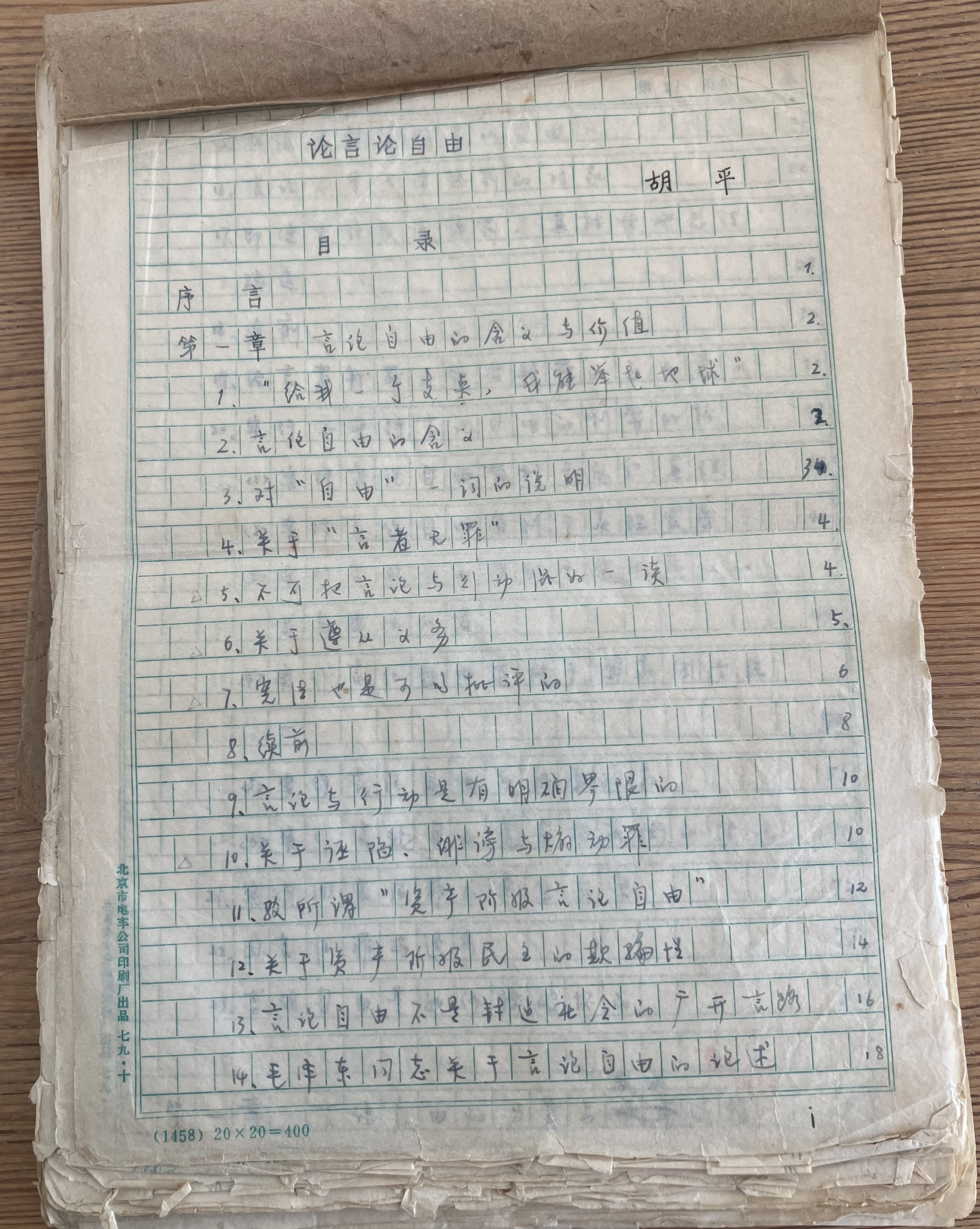
“The yearning for freedom is born from pervasive oppression”—Hu Ping on his 1980s essay, “On Freedom of Speech”
The China Unofficial Archives Interview Series No. 1

The True Face of Fang Lizhi
The True Face of Fang Lizhi was edited by the General Office of the Central Commission for Discipline Inspection of the Communist Party of China and published by Law Press in July 1989.
Fang Lizhi was one of Beijing's most prominent intellectuals during the 1989 Tiananmen Square Democracy Movement. An astrophysicist, he was labeled a "rightist" in his earlier years. Starting in the autumn of 1988, he actively participated in political study groups at Beijing's universities and gave interviews to foreign media, openly criticizing the Chinese Communist Party's Four Cardinal Principles, which called for upholding socialism and the Communist Party rule. His views resonated with students in Beijing at the time.
On January 6, 1989, he penned an open letter to then-Central Military Commission Chairman Deng Xiaoping, suggesting that democracy activists like Wei Jingsheng be released that year for the National Day celebrations. In February 1989, Fang Lizhi wrote "China's Hope and Disappointment," which Wang Dan and others posted as a big-character poster at Peking University. In June 1989, the CCP authorities issued an arrest warrant for Fang Lizhi on charges of "counter-revolutionary propaganda and incitement." Fang subsequently sought refuge in the U.S. Embassy and later sought exile in the United States.
This book serves as a propaganda tool for the Chinese Communist Party, compiling Fang Lizhi's what the book called "reactionary statements" where he "opposed the Four Cardinal Principles and advocated bourgeois liberalization." It also gathers articles from Chinese Communist Party newspapers that criticize Fang Lizhi for "inciting and organizing the June Fourth riots." From an official government perspective, the book offers insights into Fang Lizhi's ideas and sheds light on China's social and political thought environment before and after June Fourth.
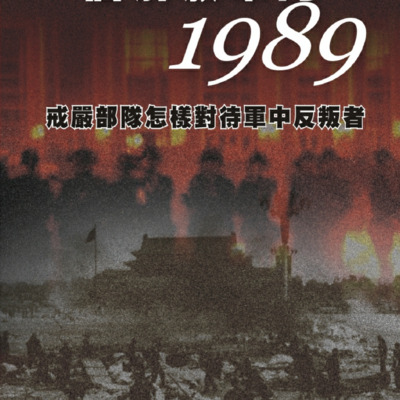
An Eyewitness Account of 1989 by a PLA Soldier
An Eyewitness Account of 1989 by a PLA Soldier is written by Cai Zheng. In 1989, Cai Zheng was serving in the People's Liberation Army Air Force in Beijing. On June 5th, near Tiananmen Square, he was arrested and severely beaten by martial law troops after he protested against the massacre. He was then detained for over eight months at the Beijing Xicheng Public Security Bureau and by his own military unit, enduring torture. Afterward, he was sent back to his hometown of Hong'an in Hubei province.
The book offers a detailed account of Cai Zheng's experiences as a soldier during the June Fourth crackdown and his subsequent struggles for survival in his hometown. It provides valuable insights for researchers seeking to understand China's social and historical environment before and after the events in 1989.
Published in 2009 by Mirror Books, this memoir is held in various public libraries in Hong Kong and by many university libraries worldwide. The book has also been subject to pirated editions within China.
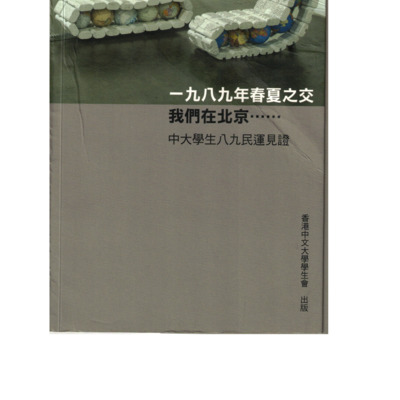
Summer of 1989: We Were in Beijing
<i>Summer of 1989: We Were in Beijing...</i> compiles numerous firsthand accounts detailing the experiences of students from The Chinese University of Hong Kong (CUHK) who were in Beijing and Shanghai during the 1989 democracy movement. A total of thirty CUHK students traveled from Hong Kong to Beijing to show their support.
The Hong Kong students interacted with student movement leaders at the time, attended meetings of the Beijing Students Autonomous Federation, participated in organizing efforts, and even edited a publication called <i>News Express</i>. They also set up a supply station of provisions in Tiananmen Square and supported the establishment of "Tiananmen Democracy University." A number of these students personally witnessed the June Fourth crackdown.
On the eve of the crackdown, official broadcasts in the square sternly criticized students from “a certain Hong Kong university” for forming illegal organizations. <i>People's Daily</i> directly named and criticized the Chinese University of Hong Kong Student Union on June 15th, after the crackdown occurred.
The Chinese University of Hong Kong Student Union published this book in 2014, stating its purpose as safeguarding history and combating official brainwashing. It also hopes that readers will understand the Tiananmen democracy movement from the perspective of Hong Kong students and to explore the role of CUHK and Hong Kong academia in this movement.

A Chronicle of Heroes in Quelling the Turmoil
<i>A Chronicle of Heroes in Quelling the Turmoil—A Collection of Reports on the Deeds of Heroes and Models in Suppressing the Counter-Revolutionary Rebellion in Beijing</i> was published by Guangming Daily Publishing House in September 1989. As one of the Chinese Communist Party's official propaganda projects after the suppression of June Fourth, this book collected speeches from a nationwide speaking tour organized by the authorities after the suppression to publicize the "great achievements in quelling the counter-revolutionary rebellion." It is one of the texts for studying June Fourth from the official perspective.

One Day Under Martial Law
<i>One Day Under Martial Law</i> was edited by the Cultural Department of the General Political Department of the Chinese People's Liberation Army (PLA), and published and distributed by the PLA Literature and Art Publishing House in October 1989.
The book is divided into two volumes and collects a total of 190 signed articles. Apart from a few police officers from the Beijing Municipal Public Security Bureau at the time, almost all the authors were soldiers from the PLA martial law troops.
This book is a valuable resource provided by the martial law troops, a special group of witnesses to the June Fourth Tiananmen Incident. The book is a valuable source of information for researchers seeking information on the troops that participated in the June 4th massacre.
This book was also a primary reference for scholar Wu Renhua when he wrote the book <i>The Martial Law Troops in the June Fourth Incident</i>. As an officially organized piece of propaganda material, the book's original intent was to applaud the troops and individual officers and soldiers for what the government described as "quelling the counter-revolutionary rebellion." However, because it revealed too much true information, the book was banned shortly after publication. In 1990, the publisher reissued what it called a "selected edition" of the book, which removed over a hundred articles, retaining only 80 signed articles, and the total word count of the book was reduced by more than half. The Archives has collected the original two volumes of <i>One Day Under Martial Law</i>, as well as the “selected edition" that was published after being censored.

Declassified Files of the Canadian Government on the June Fourth Incident
This document, declassified in January 2015, contains a 1989 diplomatic memorandum from the Canadian Embassy in Beijing. It describes the circumstances surrounding the June 4 massacre as they were known to officials at the Canadian embassy.
The documents, declassified by the National Library and Archives of Canada, show the Canadian government's concern about the invasion of the embassy by Chinese troops. The documents also describe the crackdown in Beijing and how the troops killed citizens.

New Evidence Concerning the Authenticity of The Tiananmen Papers
Few books on recent Chinese history have caused such controversy as "The Tiananmen Papers". The book is ostensibly a collection of original documents compiled by Zhang Liang, a pseudonym for someone claiming to be a high-ranking CCP official who leaked the papers. The book’s credibility was aided by it being edited by two well-known western scholars of China, Perry Link, then of Princeton University and now of the University of California, Riverside, as well as Columbia University professor Andrew J. Nathan. An introduction was written by Orville Schell, a well-known writer on China who was then a professor at the University of California, Berkeley.
Almost immediately upon publication, the book was criticized for its unclear provenance, a point aided by Zhang Liang’s anonymity. Most scholars agreed that the papers were a mixture of previously released documents from government offices, which were uncontroversial, and accounts of meetings between senior leaders. The latter came under scrutiny, with some saying that the language appeared stilted or seemed to mix in language used in leaders’ public speeches.
This essay by the well-known Hong Kong publisher Bao Pu points out that since 2004, most people seem to feel that the issue of provenance will never be settled but that the documents are still important historically. Bao critiques this, using books published over the past two decades to update the question of authenticity. In careful language, he further questions key points of the documents, showing that they do not match new material, such as memoirs. Bao's conclusion: the Tiananmen Papers are not documents from the CCP’s archive, which is their claim, but rather works of dubious origin that cannot be used to better understand the events leading up to the massacre of civilians on the night of June 3-4, 1989. The top-secret documents, Bao writes, are a “phantom” that must not be used as building blocks for history.

Jiang Qisheng: Civilian Report on the Situation of June 4 Victims in China
The Tiananmen Square massacre on June 4, 1989 and the subsequent mass arrests and purges created tens of thousands of June Fourth victims. Among them were June Fourth victims who fell into a pool of blood, the June Fourth disabled who were shot, the families of the June Fourth victims and the severely disabled, the June Fourth prisoners of conscience who were sentenced to imprisonment or re-education-through-labor, and the June Fourth victims who were subjected to other political persecution. On the occasion of the 20th anniversary of June Fourth, as part of Chinese civil society's efforts to recover the historical truth and rebuild historical memory, this report gives a basic description of the suffering of the June Fourth victims and their arduous journey over the past 20 years. It also analyzes the systemic factors that have contributed to the victims' suffering and proposes corresponding recommendations on how to change their living conditions.
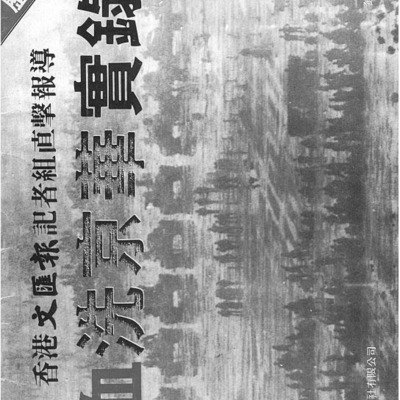
Bloodshed in Beijing and China: Hong Kong Wen Wei Po 1989 Special Edition
During the pro-democracy movement in 1989, Hong Kong journalists gathered in Beijing, including Wen Wei Po reporters. This book is a special issue of *Wen Wei Po* for 1989. It contains a large number of photographs, all taken by its reporters. "After the June 4 massacre, the Communist Party of China (CCP) settled scores with the editorial team of Hong Kong's "Wen Wei Po," replacing the president, editor-in-chief, and deputy editors-in-chief. The editor-in-chief at the time, Jin Yaoru, later moved to the United States and publicly announced his resignation from the party.

Who is the New China
Author Xin Hao Nian tries to analyze the modern history of China since the Xinhai Revolution. He pointsout that the People's Republic of China (PRC) is a restoration of the authoritarian system, and the Republic of China (ROC) represents China's road to a republic. The first volume of the book defends and clarifies the history of the Kuomintang (KMT), arguing that the KMT is not a "reactionary faction" as claimed by the CCP. The second volume criticizes the revolution and history of the CCP. The book was first printed in 1999 by Blue Sky Publishing House (USA) and reprinted in June 2012 by Hong Kong's Schaefer International Publishing. It is banned on the mainland.
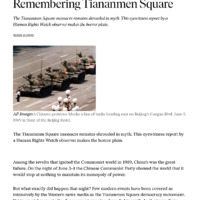
Remembering Tiananmen Square
The author was a Hong Kong-based observer for the international human rights organization Human Rights Watch. Remembering Tiananmen is a long article first published in The Nationmagazine in November 1990. It was written after witnessing the crackdown around the square during the night of June 3 until 4 a.m. the next morning.
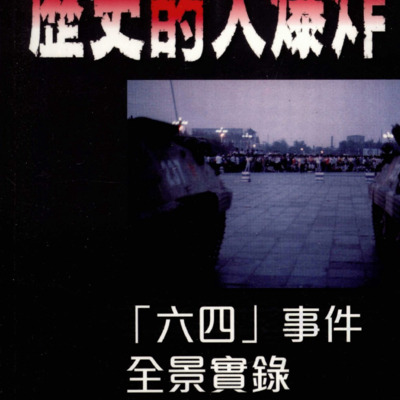
The Big Bang of History:June Fourth Movement Record
This book was published in Hong Kong in 2009, on the eve of the 20th anniversary of June Fourth. The author, Zhang Wanshu, was the Director of the Domestic News Department of Xinhua News Agency during the June Fourth Incident. This book provides a historical account of the June 4 incident from the unique perspective of the official media, including a lot of insider information. Famous journalist Yang Jijian commented that the book's historical authenticity is beyond doubt, and that it is an indispensable historical document for the study of the June Fourth Incident. In the form of daily events, the book records the situation from April 14th to June 10th, 1989—including the mobilization of 10 armies by the Central Military Commission from the five major military regions, their march to Tiananmen Square along six routes, and the army's entry into the city in disguise, etc. Of particular interest is Zhang Wanshu's citation of Tan Yunhe, then party secretary of the Red Cross Society of China, who said that there were 727 deaths in the June 4 incident—including 713 students and mass deaths and 14 military deaths. This figure is far from the 2,700 recorded by the Red Cross Society of China and has led to much controversy.

Living Monument in the Square: June 4 Bloodshed through the Eyes of a Hong Kong Woman Reporter
The author of this book was a reporter for "Sing Tao Daily" and was stationed in Beijing at the end of April 1989 to cover the democracy movement. The book is divided into six main parts: Square Facts records the course of the 1989 democracy movement, from the author's visit to Beijing in April to the early morning of June 4, when she and the masses were evacuated from Tiananmen Square. The second part concerns post-hijacking memories, which are some of the author's interviews from 1989. The third part concerns the interviews. The author had interviewed 7 student leaders and intellectuals that year. The leaders told her the reasons why they devoted themselves to the student movement. The fourth part is about the rest of the author's life, from June 4 to December 1990. The author has recorded some fragments of her speeches to the secondary school students in Hong Kong. Some of them are sentimental, some of them are confessional, and all of them are sincere and heartfelt. The fifth part is "Twenty Years of Wounds," which is a reminiscence written by the author on the 20th anniversary of June Fourth. The sixth part is about the grassroots of June 4. These grassroots actors have been pretty much forgotten. The author wanted to write a biography of the grassroots of June 4 in order to fill in gaps in history.
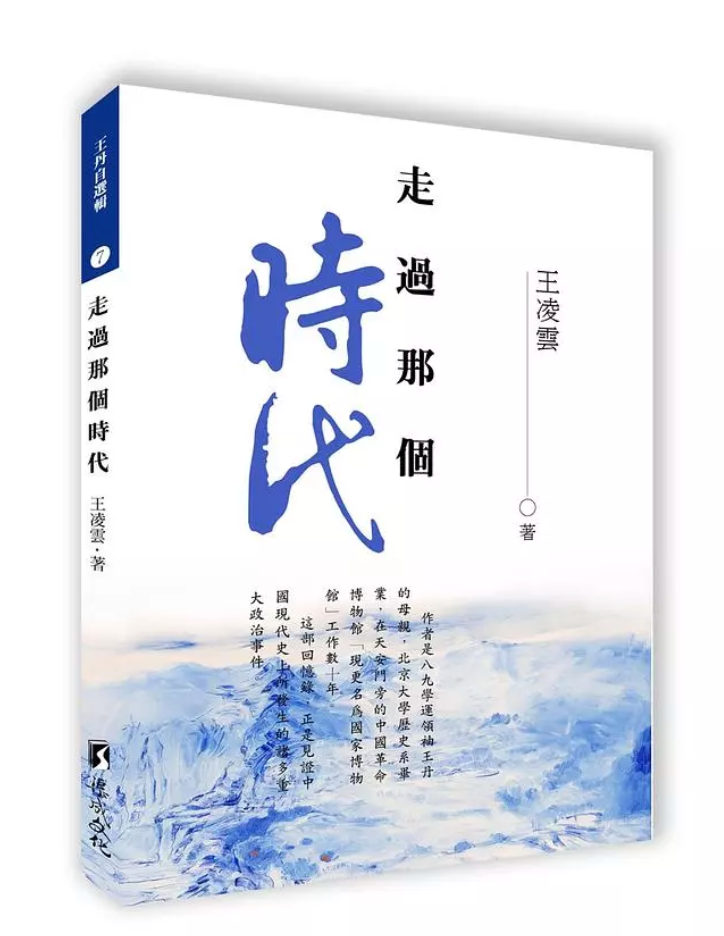
Walking Through That Era
The author of this book, Ms. Wang Lingyun, is the mother of Wang Dan, a student leader of the June Fourth Movement. She graduated from the History Department of Peking University and worked at the National Museum next to Tiananmen Square for decades. This memoir, published in Taiwan in 2021, is an account of the major events in modern Chinese history, including the 1989 Tiananmen Square democracy movemen.
This is the link to purchase the book:
https://www.eslite.com/product/1001273162681985770003

Rethinking China's Democracy Movement
Author Hu Ping was involved in the Xidan Democracy Wall movement in the late 1970s and now lives in the United States.
He has successively chaired the pro-democracy publications <i>China Spring</i> and <i>Beijing Spring</i>. This book, published in 1992, analyzes the reasons for the failure of the June Fourth Movement and summarizes the lessons learned. The last two chapters suggest how to continue the pro-democracy movement in the future.

The People Will Not Forget: A Chronicle by 64 Hong Kong Reporters
This book, published by the Hong Kong Journalists Association, collects the June 4 reports from 64 Hong Kong journalists. The first edition was released in July 1989, and the book was reprinted on the 20th anniversary of June Fourth in 2009.
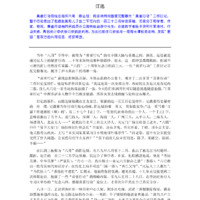
Operation Yellow Bird
After the bloody suppression of the June 4 Democracy Movement, the Chinese Communist Party went on a massive manhunt for the key figures of the movement. Some Hong Kong people organized a secret channel to help pro-democracy activists escape from the Mainland, codenamed "Operation Yellow Bird." The author of this book, Jiang Xun, is a veteran of the media and describes in detail how the "Yellow Bird Operation" took place.
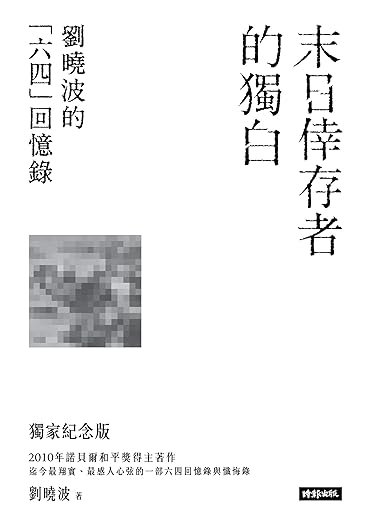
Monologue of a Doomsday Survivor: About Me and June 4
购书链接:https://www.kobo.com/hk/zh/ebook/ZoerWPfG8TiqoXIYwvW2iw。
